impalement
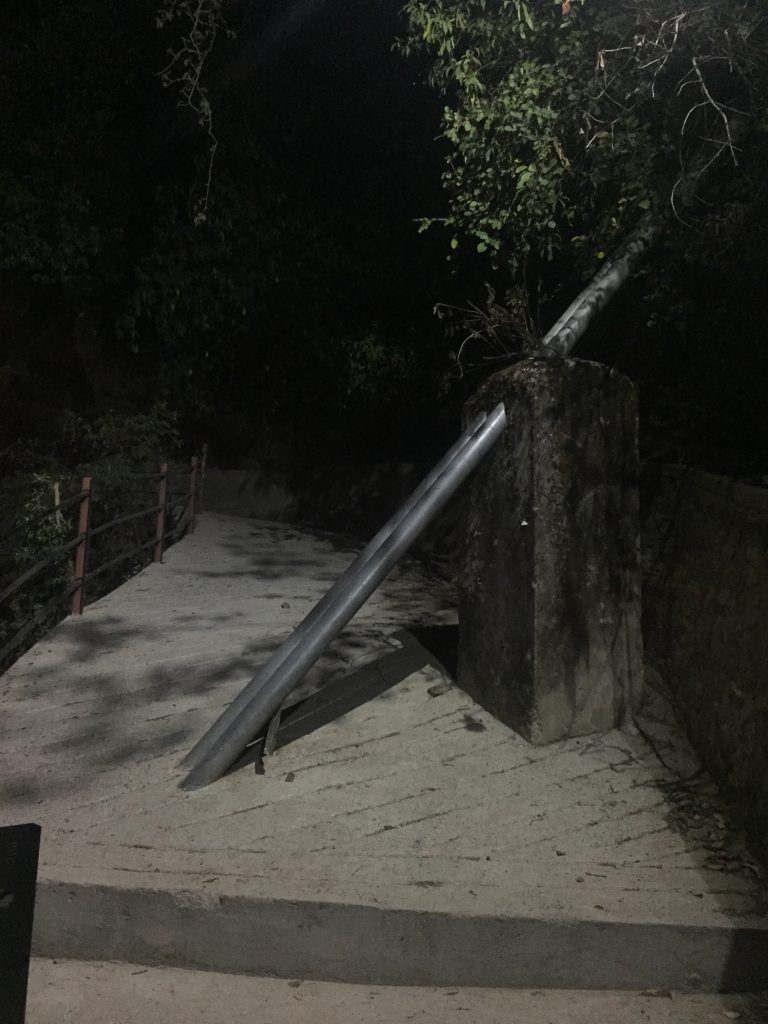
The traveler explores the American Wayside, verifying the contents of a mysterious guide written by a man with whom he shares a likeness and name. Excerpts from ‘Autumn by the Wayside: A Guide to America’s Shitholes’ are italicized. Traveler commentary is written in plain text.

‘South Dakota boasts a peculiar slogan, ‘Great Faces, Great Places,’ and they would have you believe this was in sole reference to Mt. Rushmore. Beyond this, they would have you believe that Mt. Rushmore accounts for all of the stone faces available along the Wayside and that it is the creation of a species that, admittedly, so enjoys seeing itself that a great portion of its artistic endeavors attempt what a mirror or camera or a well-programmed 3D printer could create in an instant. Can you imagine, reader, if we were not alone in this motivation? Can you imagine the statue of a buck fashioned by its own hooves, the pointed horns a still-green pine branch that shivers in the wind and the eyes, black stone?
The truth is that there are faces everywhere and there are more faces every day- the warped faces in the wood grain of your childhood wardrobe, the crude gaping mouths of cliffsides and ancient trees all early stages of the same phenomenon. These faces did not always exist but, having recognized the faces in the Black Hills, the nation can no longer contain them.
The first time the faces were brought to the attention of America’s colonizers occurred when a pioneering woman named Leana Brookings fell into a sinkhole that she hoped would lead her to gold. In excavating several similar pits nearby her family revealed the face of a great uncle, screaming (or yawning) at the cloudless sky (the initial pit being just one of his deep-set eyes). So struck, were they, with the dread of deep space and dark water (seeing something so familiar made monstrous) that they set to leveling the land. The second recorded incident was of ‘The Overhang Smile,’ a beloved natural fissure observed by the denizens of a canyon settlement. The fissure is said to have dissolved in a sudden rockslide, killing a man and simultaneously revealing his own smiling face below the rough caricature that had previously been the center of sentimental stories (most of which seemed to suggest the white man had always been in the Black Hills).
The faces occur on a small scale as well, looking down from cavern ceilings, their gaping mouths serving as handholds to unwitting spelunkers (whose lights make shadows and faces of everything in the dark). Some emerge, smooth and cool, from river-washed stones. Others break fully-formed, a blight in the crystal hearts of local geodes. No matter the size, the faces play on the human psyche like an itch- sometimes fearful like the crawling of an invisible insect and sometimes annoying like the peel of a dried scab. In either case, the faces seem to call a viewer to scratch and, in either case, the scratching only seems to worsen the condition.
Aside from Mt. Rushmore and Crazy Horse (which emerges inevitably despite a concerted private effort to demolish it), undamaged specimens can be viewed in a shallow cavern outside the ‘Gas n’ Begone.’ Zelda Flanders, owner, does not publicly advertise the faces but will sell you instructions to the trailhead and rent you a flashlight with the same demeanor a conservative drug-store cashier might employ in selling condoms to a nervous teen. She will offer no rules to guide your tour, secretly hoping that someone will do away with the silent audience that darkens her property like mold in a closet.’
– excerpt, Autumn by the Wayside
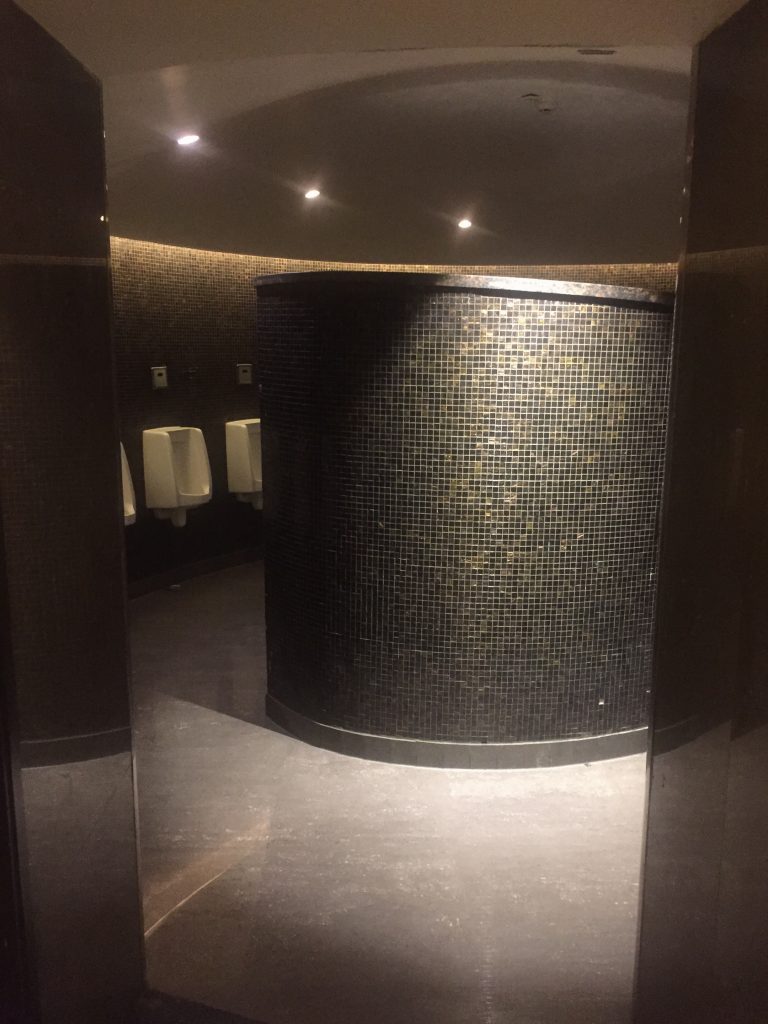
“Are you sure you’re all right?”
The Editor chews slowly, her eyes drooping and unfocused. Syrup glistens at the corners of her mouth and her voice is thick.
“I’m fine,” she says, “Just tired. And this place… is gross.”
A young woman walks behind us and she slides a pancake onto the Editor’s plate. The air is thick with melted butter. I’ve hunched my shoulders to protect my own eating area and I take small, regular bites. When I’m not eating, I hold one of the few of Alice’s remaining picks between my lips. This appears to be one of the few acceptable non-eating activities.
Unfortunately, the pick seems to invite conversation, so I eat instead, feeling the edges of my inner-self expanding uncomfortably.
The Editor gags in her chair and I try not to let her disgust spread to me.
‘There’s no magic greater to middle America than a pancake feed. Ostensibly for charity, these events probe the deep stomach of the corn-fed lower class to fund causes few participants will remember past the drive home. In truth, a pancake feed represents the classic capitalist trade-off: money for cleansing.
The cleansing ritual of the ‘Pancake Feed’ involves the three-part dedication of time, sacrifice, and debauchery (making it distinct from those that require only one of the aspects, say, the sterile donation of money by mail, the hammering of a few nails in the skeleton of a charity house, or the straightforward gluttony of an all-you-can-eat buffet). It is an archetype (in miniature) of the American dream in which the lower-class is encouraged to show up, to invest money, and to reap the promised benefits (in the form of the nation’s principle cereal grain, no less), failing to realize that it is the lower-class working behind the scenes as well: a sloshing-about of money in an already shallow pool.
All this to say that the ‘Eternal Pancake Feed’ is an American abomination. 2019 marks its 32nd year of continual pancake production, locked in place by a single participant, Edith Baker, who has consumed pancakes at a steady pace since the fateful July 4th on which it began. Baker has grown to an enormous size and has not responded to attempts at communication since the late nineties when she apparently said “Pass the butter, if you would.” A conservative estimate suggests Baker has eaten 24 tons of pancake in the last three decades, all for the entry price of two U.S. dollars. The feed continues as long as she eats, fueled by a certain sense of obligation to uphold the ‘all-you-can-eat’ promise and, no doubt, by grim curiosity.
Despite opening the ‘Eternal Pancake Feed’ to further customers, the event ceased being charitable, or lucrative, a long time ago. It has bankrupted the food bank that it once partnered with and remains a minor drain on the state’s budget: a single citizen’s mindless greed funded by taxpayers through the exploitation of a minor loophole.’
“She’s like those little Venus figures.”
The Editor’s sudden interjection catches me off guard. Alice’s pick slips from between my teeth and lands upright in the soft flesh of the pancake on my plate.
“What?”
“Like the… the fat women they dig up. The old goddesses.”
I look down the table at Edith Baker, who sits at the head. I wonder if she sat there originally, knowing what was to come, or if they’ve since moved the table to indicate her legacy. I retrieve Alice’s pick and suck the crumbs from it.
“The Venus statues never had faces,” I say, “No mouths to eat with.”
“No mouths to talk with.”
“You think ancient humans had pancake feeds?”
“Just a comment,” she says.
It’s good to hear her talking, I realize. It’s the first unprompted thing she’s said since I found her again.
-traveler
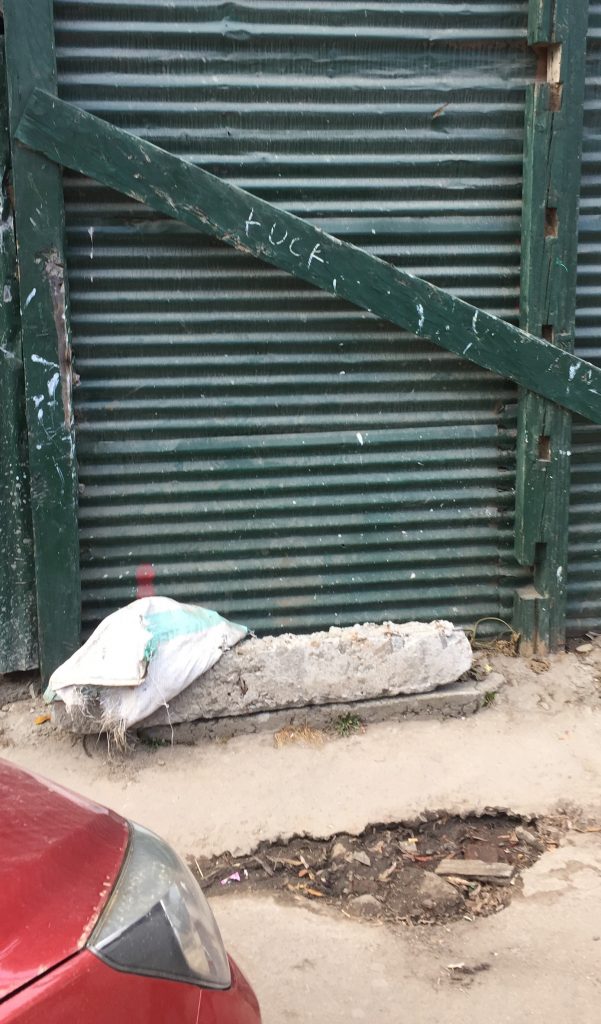
The Editor does not reappear for quite some time and I lug her books aimlessly into the south, where autumn is warm and dry. She has left her journal behind, the book she uses to keep track of the differences between Shitholes editions. The first hundred pages are beautiful, looping scrawls- as clear as the night sky. The writing degrades, though, her form as well as her words. By the end she’s writing in a shorthand so frantic it might as well be code. She has predicted I would read this all, someday, and she rails against me when she remembers to. The Editor insists that I tell her once I have and is so sure that I won’t.
She’s right, of course.
I wonder what she thinks of me, sitting as she does on the bike.
There is a picture of us on a rollercoaster- a place ‘Autumn by the Wayside’ said was haunted by spirits from all over the country.
‘What?’ it asked, ‘You don’t think ghosts can have fun? Free from mortal concerns, the previously-fearful departed have no reason not to try these things. Though, spirit photographers have captured increasingly long lines…’
The Editor has no interest in the places we visit, only the order in which we visit them. Had she asked why I bought the picture (priced steeply at $29.99 for the smallest option) I would show her that my family’s dog sits just behind me, its semi-transparent tongue dripping ectoplasm into the wind. The dog, I would explain, was alive when I left. But she was old, so…
So it’s not a surprise.
I have not pressed the issue, though, because behind the dog and behind the Editor, as far back as the camera has captured, the ride seats are busy with her own spirits, each stern-faced in turn. I look at the picture, and I wonder if the new Editor is the one I should tell. She doesn’t seem to think these little deaths matter in any iteration, and truthfully, each Editor is identical to the last. I would not have guessed there was a tally and, faced with it, I’m not sure what it means.
-traveler
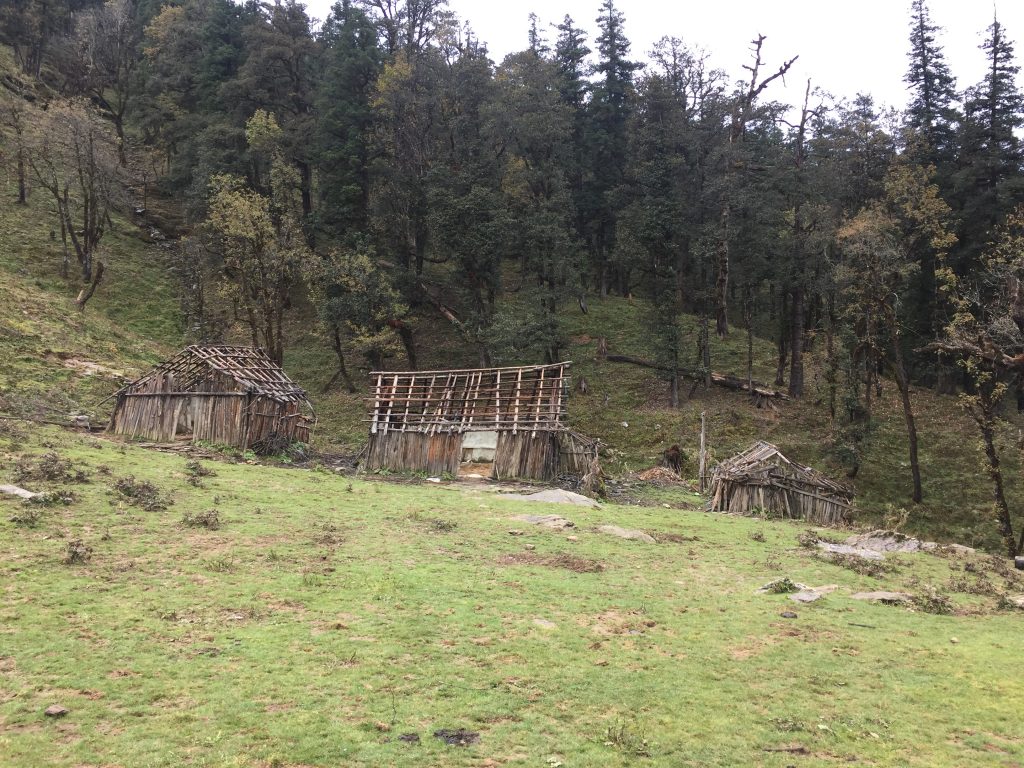
‘We are assured, as children, that the vast majority of our fears are unwarranted and that the world is a mundane place so when, as adults, ‘The Parade of Strangers’ arrives in town, we hardly bat an eye.
Is it the celebration of some secret society? Is it a memorial for a forgotten war? Could it be a charity event or a publicity stunt? For whom do they raise the money? What are they trying to sell us? Perhaps they are a friendly, if underrepresented, religion, celebrating some esoteric holiday that the government refuses to recognize. Perhaps they are a roving militia, re-distributing their apocalyptic supplies.
They are none of these things, or, they are a lurching chimera of them all. ‘The Parade of Strangers’ descends upon a town much like a spat of rain: with no motive except to move through it, on the way to destination yet defined. Like a spat of rain, we endure it.’
As always, there are websites that track these things- a website that tracks and attempts to predict the movement of ‘The Parade.’ It is estimated to be three and a half miles long when we check, moving south down I-75 at about 40 mph. We approach its tail and break from the interstate as soon as we begin to see candy on the ground. It sits in sticky piles on the median.
Believe it or not, it’s the Strangers that began the great American tradition of throwing candy from a parade. It is an act that is quintessentially strange, invoking the early-American disregard for litter and an unwarranted trust for white American men. We’ve learned better, since then, and now we warn children that Strangers are exactly the sort of person you shouldn’t be taking candy from. Candy can only mean an ulterior motive, kids, unless you’re paying out of pocket. A candy debt to the Strangers is not something you want on your file in ‘The Secret Bank.’ Low entry, high interest.
No easy bankruptcy.
It would be time-consuming and difficult to try to pass ‘The Parade of Strangers’ from behind but the next best way forward still means bisecting it at some point. We settle on a suburb of Louisville, hoping to cut through early, but the motorcycle isn’t taking well to hauling the little trailer of books (the Editor, herself, weighing next to nothing behind me and refusing to wrap her arms around my waist), so we arrive late and find we’re just in time to see the dead-center passing through downtown. It’s visible from miles around, a flock of birds hovering overhead like a sugar-starved thunderhead.
Seeing it, again, I may as well be back in ‘The City of Strangers.’ They have taken most of it with them, the King’s skyscraper looming over the little suburban townhall like a schoolyard bully. Candy rains down from broken buildings as they are pulled along the street. It shatters on the ground and leave dents on the cars parked along the road. The whole thing is noisy- the rattling of broken candy and the roaring of diesel engines as they struggle to pull the buildings through Main Street. Someone is playing music but its volume relative to everything else makes the gesture seem sarcastic and threatening.
Nobody has come to see this parade, but nobody attempts to stop it. It’s another day in the world and another person’s business as to what this is all about.
“There’s an opening up ahead,” the Editor shouts behind me, “You’ll have to be quick.”
The Strangers eye us as they pass, smirking at the bike’s exhaust and the idea that we might find a way to cross. I breathe heavily under the helmet, fogging the inside. It wouldn’t have been hard for them to learn my license plate, the make and model of my set-up, but it wouldn’t be like them at all to consider the details. As unlikely as it may be, I think any one of these men could know me by my face, or by the way I walk, or by the way my shadow lies a little too thick on the ground. I look ahead to where the Editor has spotted the way through and I ready us for the charge.
Much as we both assumed (though these suspicions often remain unspoken between the Editor and I), the Strangers try to close the gap the moment they realize we’ll be trying to slide through it. Whether they recognize me in the moment, or whether this is just their way, the truck engines spin screeching rubber into the pavement with the effort of the Strangers to jolt forward. Candy rains down maliciously, then, cracking the headlamp and sticking in the treads of the tires. We skid through the rainbow hail and I topple the bike on a hidden curb. I rise quickly and see the Editor struggle.
Her left arm is broken.
The Strangers seem to lose interest now that we’ve crossed but I am careful to leave my helmet on. The Editor pulls painfully at her own and eventually allows me to remove it for her. She frowns at the dangling wrist and glances between the trailer and my covered face.
“Can I trust you with these for now?” she asks, “I don’t really want to travel on this arm.”
Before I can answer, before I can begin to guess the time it takes for a broken bone to heal, the Editor pulls a small pistol from her bag and levels it with her head, spraying a nearby van with blood and brain-matter.
I swallow my gum.
The Editor exists in all timelines- she’ll be back when I make a decision that sends us down a new path. I admire her fearlessness for that time in-between, but shudder to think of it myself.
-traveler
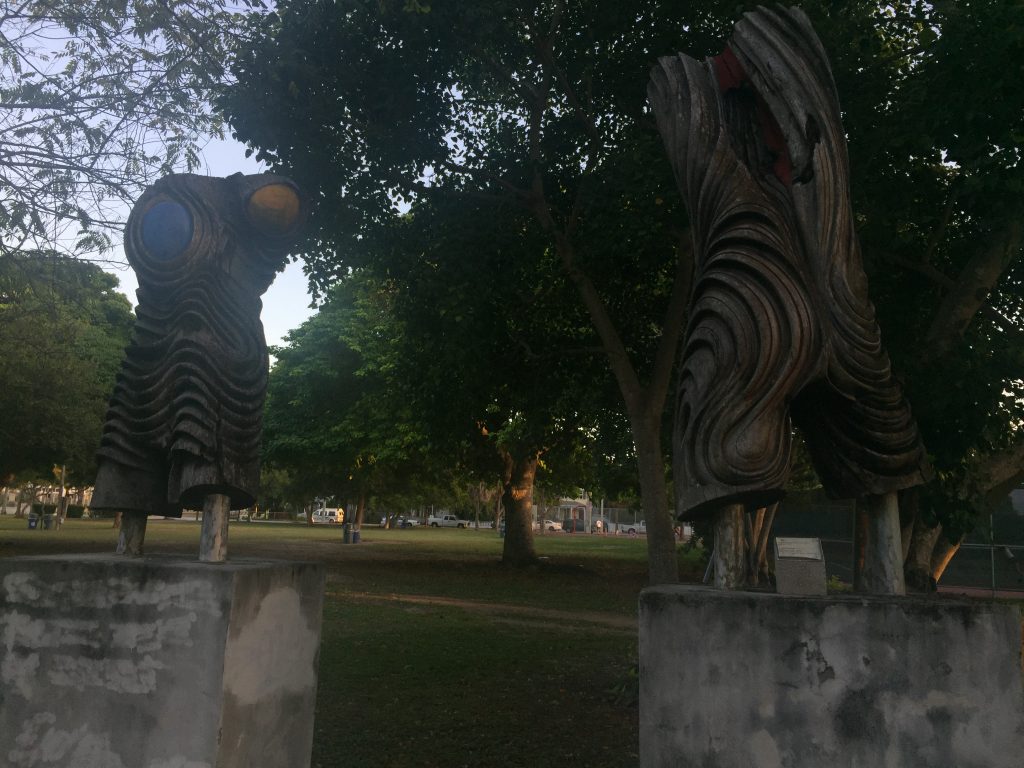
“This isn’t right, either.”
The Editor stands over me, dozens of books piled between us. This represents a few boxes’ worth of her collection of ‘Shitholes,’ which supposedly includes a single copy of every edition. The books arrived by mail on the same day, each in its own padded envelope. It’s standard practice, she told me, for her company to send her a published copy of a book she’s edited. Usually just the one, though. The Editor believes she stands at the nucleus of a supposed multiverse.
We all want to be special.
“What’s not right?” I ask.
“The chronology,” she says, “I think we’ve cut out as many good endings as bad ones.”
Alice’s pick breaks between my teeth, the shattered middle soft as a paintbrush against my palate.
“I thought…”
“I know,” she says, “I thought I had it too. There’s just too many to keep them straight and every time I read one I think I remember why I put it in that particular order and… Why are you looking at me like that?”
“You’re still trying to kill me,” I say.
“What?”
“You’re still trying to kill me,” I tell her.
And the second time I say it, I know it’s true.
‘Save for those that wind through the larger, carefully-tamed National and State Parks, most beloved trailheads are crowned with what appears to be a low tangle of rusted barb wire, as though the way were once forbidden but time and negligence have thrown open the doors. The wire reappears often, in twisted piles at the bottom of unexplained pits and in creaking strands, half-absorbed by the cancerous bark of old trees. This is ‘the Devil’s Grapevine,’ an American weed so widely spread as to be subtle, but as mischievous as poison ivy.
The great North American network of ‘Devil’s Grapevine’ maintains a core in western Alabama, a well, of sorts, from which all its tendrils spring. Wind passing over the well greets the human ear like whispered intimacies. Some would have you believe these are rumors, snagged from the skin of clumsy hikers. To visit the core is to submit yourself to the shallowest concerns of all who have felt the sting of its thorns, twisted, as they are, by the paths that brought them there.’
“Don’t be an idiot!” the Editor shouts, “It’s just the wind.”
She throws a copy of Shitholes at my head, its pages exploding across the field. The spine snaps down on the bridge of my nose and by the time my eyes regain focus I realize she’s right.
“Sorry,” I say between my fingers, “But you were trying to kill me.”
“You should hear what it’s been saying about you,” she says, sneering from behind a hardcover.
“I said sorry.”
“A fifty-fifty reduction isn’t that bad,” she reasons, “It means we haven’t done any harm, and we’ve narrowed the future choices down a bit…”
“But…”
“But,” she admits, “The majority of the remaining good timelines, the ones where you live, they all take you back through the ‘City of Strangers.’”
“What? Why would I go back there?”
“It’s different now,” she says, “The city is moving. It’s like a… barricade. And it’s standing between us and the end of this book.”
-traveler
© 2024 · Dylan Bach // Sun Logo - Jessica Hayworth